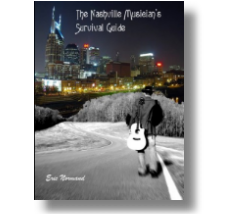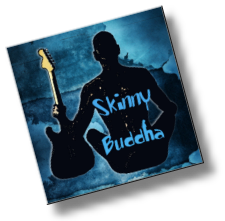
So you just moved to Nashville, you’re a good solid player with a good attitude and excited to begin working. You don’t care about being a superstar, you just want to play music with others but you are quickly learning that this can be hard to do. You are having a hard time getting off the ground. What do you have to do to get started in this town?
Regardless of your talent level, the truth is simply that talent alone isn’t going to get you work. Nashville, like any major music Metropolis, attracts talented people by the masses. They literally flock to this place in droves. This creates a supply and demand problem that works against the musicians. Knowing and understanding this is crucial. Ultimately, the only way in is by slowly nurturing relationships that will lead to opportunities. The best place to build these relationships is in the nightclubs around town. There is no shortcut to this, it’s going to take some time so be patient.
A newcomer to Nashville recently told me his story. He moved to Nashville about a year ago with the goal of becoming a part of the country music scene here. He has been frequenting the clubs downtown with the intention of sitting in and getting to know some of the players. Even though he’s familiar with most of the standards that are being played, he’s having a hard time getting past the idea of hustling to sit in. He said that he views his reasons for networking as self-serving, and this prevents him from talking to musicians because he feels self-conscious about it – like he’s using them. The end result is that he just walks around watching bands, never talks to anybody, and then goes home.
I, as well as many others, can relate. When I first moved to Nashville I was in a similar situation. How does one introduce them self to all these total strangers and maneuver his or her way into sitting in without coming off to self-serving?
One thing that worked for me was seeking out groups of players and artists that I related to musically. This makes it much easier to form real relationships that can evolve over time. Try to find a group of players, or singer that you really connect with. Maybe you really dig their song list, or are inspired by the performances of one or more of the players in the band. If you can feel a real connection through the music, it should be easy to engage in some genuine conversations – the music is your common ground. Find out when they’re playing again and become a regular. Over time they’ll gradually get to know you and sitting in will be part of a natural progression. Maybe try to cultivate a handful of different situations like this. Also, try to find these kinds of inspiring groups that are playing either earlier shifts and/or at the less popular bars. Those situations will be more laid back and might make it more likely for them to take breaks. And that combined with a smaller crowd in general will make it easier to engage in conversation.
The key to gigging in Nashville is relationships. It’s hard to force friendships and relationships to happen, they need to naturally evolve. You need to regularly put yourself in different kinds of situations where this can happen. It just takes time, persistence, and patience. Most importantly, be a good person. Of course being proficient on your axe will help to.
There is no guarantee that this approach will allow you to achieve the kind of success you envision. But for that matter, there are no guarantees in the music business, or life in general. So just suck it up, be in it for the long haul, and get out there and start pounding the pavement. Be friendly and outgoing and put your best foot forward. Talk to people. Take an interest in their careers and lives. Try to find some common ground and build relationships with players that you relate to. If you have already tried this and haven’t yielded much results, try harder.
That’s what it takes to get started in Nashville.
So you’re thinking about moving to Nashville. You’ve heard there’s a big music industry centered here and you want to work in it. You’re ready to relocate for the right opportunity and just posted a craigslist ad to notify the Nashville music community about your availability. What kind of opportunities exist here for you?
If you’re not already living here, then the answer is none. That doesn’t mean there aren’t any opportunities here for you, just that you need to live here if you want to be in the game. The most important thing to understand about the Nashville music industry is that it is very much community oriented. Most of the people earning a living from music in Nashville have been here for years, and many of these Nashville veterans have a long list of friends that are also working in the music business. When a tour needs to hire a new player, most band leaders want to hire someone they are familiar with and will start going down their list. They want to not only know that they are hiring a competent player, but one who is easy to get along with, someone that will fit into their touring “family”. In more cases than not, that player will either be someone they know personally, or who was referred by someone they know.
The same is true of the recording community as well. You’ve got to be proficient on your instrument, but you’ve also got to be someone that’s professional, easy to get along with and has already established these prerequisites. In most cases the session leader will hire others who are already established in the recording community and a part of that family.
For newcomers, this is the world you are entering and you can’t expect people to hire you before you’ve established this kind of reputation personally. Simply posting an ad from out-of-state with an audio link of your playing and your credentials doesn’t establish friendships and relationships. You need to be here. And you need to be here for a while (think in terms of years, not months) to establish the kind of relationships that might get you hired on a tour or recording session. You must invest yourself in the community, be a good person and work hard over a long period of time to establish your reputation. This is likely the case in any music community but holds especially true in Nashville where the supply far outweighs the demand.
The Internet can do a lot, and of course there are exceptions to every rule. I have met people online, be it message boards, craigslist, what have you, and some of these virtual connections have even led to real friendships and relationships. But in most of these cases, at least for me, any real friendship that might have started on the Internet only fully materialized after meeting the other party in the flesh, so to speak, or at least through telephone conversations.
Another way to look at it would be to compare it to becoming an actor in Hollywood. They’ve already got plenty of great actors that are out of work living right in Hollywood. Are they going to hire a stranger from an Internet ad that lives 2000 miles away? Probably not. They’re more than likely going to hire somebody that is already a part of that community first.
If you relocate to any city and invest yourself in the community, you will inevitably have many relationships and connections after 5, 10, 15 years or more. Nashville is no different. Shortcuts are simply not available for most of us.
So maybe a craigslist ad, or other Internet ad might work for some to make an initial introduction, or even to begin establishing some relationships. But if you truly want to be in the game, you should at least be present at the game.
During the summer of 2008 when the Rhett Akins band was between bass players, our sound engineer Penn Robertson threw out the idea of calling his friend Oteil Burbridge to sub a few gigs, as he was currently on hiatus from his regular gig with the Allman Brothers. Apparently the brothers were on an extended break that summer and Oteil happened to be available and interested in coming out with us. The next thing I knew we were doing a handful of gigs with him and riding around on a bus listening to first-hand stories about my childhood idols. While the gigs and stories were great fun, it was the sound checks that were most memorable.
As Rhett and band are well-versed in the Allman Brothers classic material, our sound checks during this time period contained several songs from their repertoire; Blue Sky, Statesboro Blues, Don’t Keep Me Wonderin’, and Aint Wastin’ Time No More. These moments contained some great improvised jams propelled by Oteil’s masterful groove and melodic sensibility. It was almost as if a little piece of one of America’s greatest bands fell from the sky and landed on our doorstep, to be shared only in the moment with a few appreciative friends. Eventually our stint with Oteil came to an end but it was an inspired road to travel on while it lasted. One I will always remember with fondness and never forget. Thanks Oteil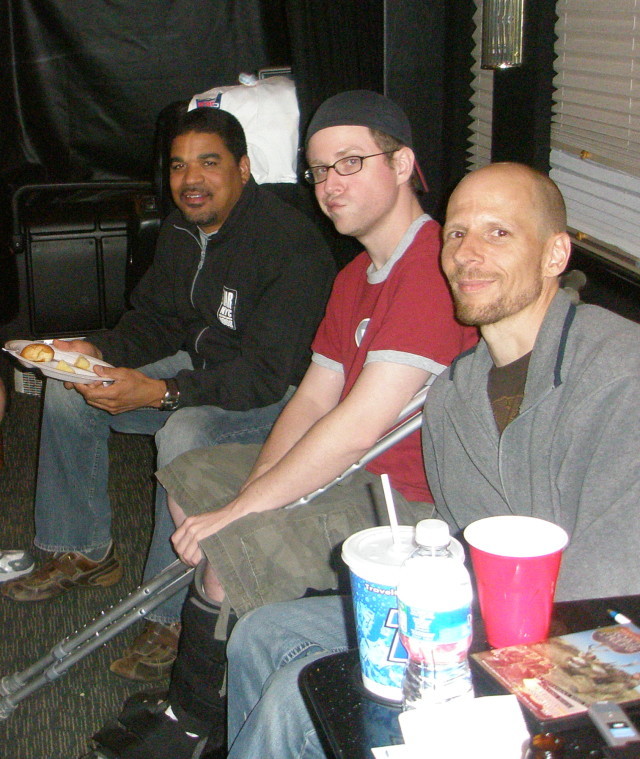
Saturday, June 19, 2010 started out innocent enough when I awoke on our tour bus in a motel parking lot in Montgomery Alabama. The fact that the nearest location of any hotel to this 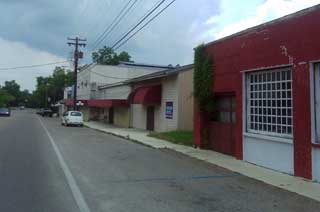 venue was a 30 mile, hour long bus ride, might have been the first clue that this was going to be a rough day. We set out at noon for this four band extravaganza at the Extreme Mud Sports Park in Eclectic, Alabama and the temperature was already into the 90s. The view from the bus window was picturesque as we wound thru this sparsely populated area of rural Alabama. The sky was beginning to cloud up a bit as we turned off the main road and began following a four wheeler down the half-mile or so “gravel” road that led into the park. The road was not in very good shape, and by the time that we realized we might be in trouble if it rained, it was too late, as we we’re already committed with no place to turn around. We came around the final corner to the “concert area” and almost
venue was a 30 mile, hour long bus ride, might have been the first clue that this was going to be a rough day. We set out at noon for this four band extravaganza at the Extreme Mud Sports Park in Eclectic, Alabama and the temperature was already into the 90s. The view from the bus window was picturesque as we wound thru this sparsely populated area of rural Alabama. The sky was beginning to cloud up a bit as we turned off the main road and began following a four wheeler down the half-mile or so “gravel” road that led into the park. The road was not in very good shape, and by the time that we realized we might be in trouble if it rained, it was too late, as we we’re already committed with no place to turn around. We came around the final corner to the “concert area” and almost 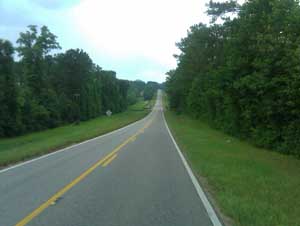 got stuck in the soft ground just backing the bus into place.
got stuck in the soft ground just backing the bus into place.
“If it rains at all, we are never going to get up that hill.” were my first words to one of the event coordinators after a brief introduction. “We got plenty of big tractors round here, don’t worry we’ll getcha out” was the response I got, and I must admit that I felt hardly reassured. I had the runner take our driver Steve to the hotel and then met the ”stage manager”, a local radio station employee whom I will refer to as “Puff the magic DJ”. I deemed him this nickname because he magically organized the daily activities by chain-smoking cigarettes while sitting in a van that was parked about 50 feet from the stage, and facing the opposite direction.
It had already rained a bit that morning, so the sound crew was running behind and our sound check had to be pushed back. We were sharing this bill was Ashton Shepherd, and were allotted the third time slot, scheduled to play at 6 PM just before Ashton. One of the only saving graces of this entire day was a selfless gesture made by Ashton’s drummer, Brian, who volunteered the use of his drum kit to the other bands to save time and stage space. Of course such a grand gesture became needlessly complicated when ‘Puff’ instructed the first band to begin setting up their drums in the middle of this tiny stage during Ashton’s band’s set up. It was inevitably up to me, apparently the only person on site to attend stage-managing school, to sort things out, and the unneeded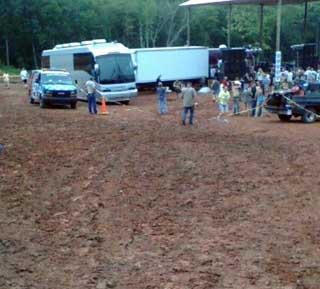 drum kit quickly vanished after a brief conversation between me and the drummers.
drum kit quickly vanished after a brief conversation between me and the drummers.
Then the rain came. It started coming down lightly sometime around 2:30, and by 3:00 it was pouring. At four o’clock it was still pouring. We watched in horror from the bus window as the only exit route, a couple of hundred feet of uphill clay colored dirt in front of us, became a nasty sea of orange mud. Meanwhile, out the other window of the bus, we viewed about 50 or so muddy looking Alabamans standing under the covered stage area in front of the sound equipment now covered in plastic, while mud covered trucks and four wheelers played in a muddy pit just beyond the stage.
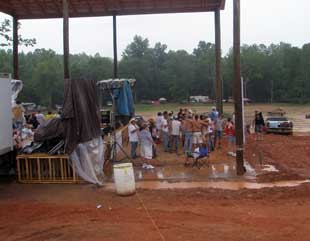 Finally, around 5:30 the rain subsided, and I sent a runner to pick up Steve at the hotel, as we now needed to figure out how we would get the bus out of this hellacious valley of mud. Meanwhile, Ashton’s band finished setting up their backline, and the first band went on just after 6:00. As the event was running two hours behind, we were now foregoing our sound checks and in “throw and go” mode. I asked ‘Puff’ to find us a table and chairs for the merch area (a request that I had previously asked him earlier in the day, earlier in the week by telephone, and in an e-mail). His response came off as this was the first time he was hearing of this and stated “I don’t know what they have here, I’ll work on it. We’ll find something”, and then he hopped back in his smoke-filled van to continue his daylong duty of staring out the window. Needless to say, the requested items never appeared despite further repeated inquiries, although Kelly was able to eventually share a table provided by Matt Stillwell’s band.
Finally, around 5:30 the rain subsided, and I sent a runner to pick up Steve at the hotel, as we now needed to figure out how we would get the bus out of this hellacious valley of mud. Meanwhile, Ashton’s band finished setting up their backline, and the first band went on just after 6:00. As the event was running two hours behind, we were now foregoing our sound checks and in “throw and go” mode. I asked ‘Puff’ to find us a table and chairs for the merch area (a request that I had previously asked him earlier in the day, earlier in the week by telephone, and in an e-mail). His response came off as this was the first time he was hearing of this and stated “I don’t know what they have here, I’ll work on it. We’ll find something”, and then he hopped back in his smoke-filled van to continue his daylong duty of staring out the window. Needless to say, the requested items never appeared despite further repeated inquiries, although Kelly was able to eventually share a table provided by Matt Stillwell’s band.
From mid afternoon on, every trip from the bus to the stage or elsewhere on the grounds required a slippery trek through three or 4 inches of heavy wet mud, caking to our feet like ankle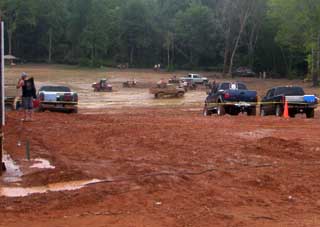 weights. At about 6:30, Steve arrived back on site, and I could see the look of amazement on his face as he appeared on the top of the hill, staring down at our pristine white bus as if it was sitting on a deserted island in the middle of the Pacific Ocean. After conversing with Steve, I approached the owners and they presented their plan to scrape off the top three or 4 inches of mud from the road with a tractor, and then to tow the bus out. Shortly after this, they began scraping, and the rest of us continued stressing.
weights. At about 6:30, Steve arrived back on site, and I could see the look of amazement on his face as he appeared on the top of the hill, staring down at our pristine white bus as if it was sitting on a deserted island in the middle of the Pacific Ocean. After conversing with Steve, I approached the owners and they presented their plan to scrape off the top three or 4 inches of mud from the road with a tractor, and then to tow the bus out. Shortly after this, they began scraping, and the rest of us continued stressing.
By 7:45, the second band ‘Matt Stillwell’ was just finishing their set and we loaded our gear onto the deck to prepare for our show. At about 8:15 we were ready to go, and Puff asked me 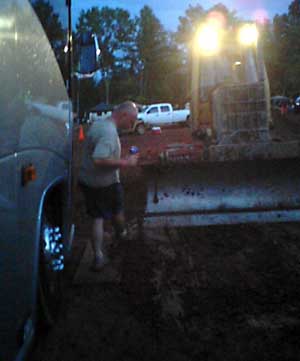 if there was anything specific he should say regarding Rhett’s introduction. I told him to mention a few of Rhett’s radio hits, and that Rhett has just released a new CD of hunting songs with Michael Waddell called ‘Bone Collector’ which is available at the merch area. So, of course, Puff delivers an intro void of any of this, and after rambling some fast talking Alabama DJ bullshit, exudes “Ladies and gentlemen please welcome to the stage Rhett Akins.”
if there was anything specific he should say regarding Rhett’s introduction. I told him to mention a few of Rhett’s radio hits, and that Rhett has just released a new CD of hunting songs with Michael Waddell called ‘Bone Collector’ which is available at the merch area. So, of course, Puff delivers an intro void of any of this, and after rambling some fast talking Alabama DJ bullshit, exudes “Ladies and gentlemen please welcome to the stage Rhett Akins.”
Midway through our set, we all witnessed what was perhaps the most exciting event of the day, that of our bus slowly moving up the hill, towed by a large tractor. I literally wanted to stop mid song and applaud as I saw it slowly disappearing from site, well on its path to solid ground. Upon this, I waved Kelly over to the stage, and asked her to organize after show transportation to the bus. She went and found Puff and requested that he had a ride ready for Rhett as soon as the set was complete, and transportation for the rest of us and our gear a few minutes later. We rocked the small but enthusiastic, mud covered crowd for about 60 minutes total, and needless to say Rhett walked off the stage to find no vehicle awaiting him. After quickly packing up our gear and clearing the stage, I went and found Puff and said “Where’s the ride? Rhett’s been waiting 10 minutes already.” “It’s not here yet?” he exclaimed. “I asked them to send somebody 5 minutes ago.” And with that, he quickly hopped in his van and drove off, never to be seen again. I can’t say I was surprised as it had long become obvious that either his memory, or his sincerity was literally nonexistent.
I found one of the owners, organized our exit, and a few minutes later we were back at the bus on the street above. The valley of mud now behind us, we could finally begin to relax. None of this kind of turmoil is ever funny in the moment, but as time is the ultimate healer, we were quickly able to see this horrific day a little more cheerfully, although we we’re now completely drained. Kelly grabbed the bottle of Crown and some solo cups, and poured a much-needed round of shots. I proposed a toast to cap off our adventures in the valley of mud. “Here’s to friends with tractors!”
I would like to add a special thanks to the guys with the big tractors, and everyone in Ashton Shepherd’s group for their generous sharing of backline, and overall team spirit.
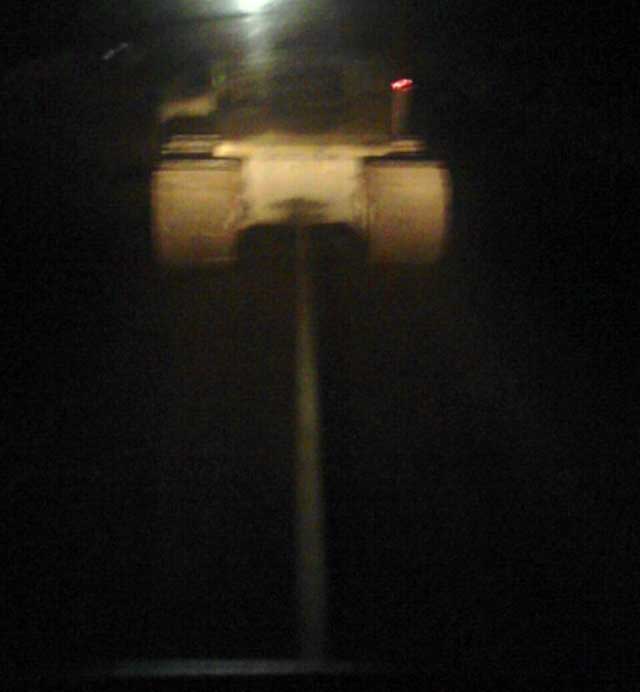
Getting a good gig is largely dependent on having the right connections. While talent and skill are certainly important attributes, knowing somebody on the inside track can be an extremely important factor when it comes to finding work.
Since my arrival to Nashville, one of the more memorable and interesting tours I’ve been fortunate enough to be a part of was the Toby Keith ‘Shock’ N’ Y’All’ tour of 2003. I had been in Nashville for about a year with no steady income to speak of, when I received a tip from friend and Toby Keith drummer, Dave MacAfee, that Toby was in need of a new guitar tech. I had previously met Dave at some of the Tuesday night hangs at the Fiddle and Steel, where I had sat in with the band he was playing with on a few occasions. Although I had moved to Nashville to pursue a career as a player, I decided to check out this opportunity, as I was badly in need of some steady income by this point.
Dave gave my number to Toby’s tour manager who hired me after a brief phone interview. I had no previous experience as a guitar tech, but I was hungry for work, and eager to learn. Ultimately, it was Dave’s recommendation that got me hired. If I didn’t know Dave, it is unlikely that I would have even heard of this opportunity. But even more importantly it was Dave’s recommendation to Toby’s tour manager that gave me instant validation. Dave had been already working for Toby for several years by this point in time, and his backing was all I needed to get my foot in the door. Once I was “in”, all I had to do was make good on my commitment, which I did.
If I hadn’t already established a reputation of being a competent, trustworthy, easy to work with player, Dave never would have recommended me for this position. In reality, if I didn’t have my act together, I probably would have never even met Dave, as he is a standup guy and a consummate professional who associates with others who are like-minded. While the old cliché “It’s not what you know, it’s who you know” is essentially true, having your act together doesn’t hurt either.
The Nashville Musician’s Survival Guide is meant to help musicians, songwriters, artists, and everyone that moves to Nashville for a career in the music business find their way. I have done  my best to describe in words what it’s like to live and work in this town. But words can only go so far. If you’re already here and working at your career in music, you’ve got a pretty good idea about the landscape. But for those that are considering relocating to Music City, the book, and the website, will contain as many photos as possible, to help give a taste of the town.
my best to describe in words what it’s like to live and work in this town. But words can only go so far. If you’re already here and working at your career in music, you’ve got a pretty good idea about the landscape. But for those that are considering relocating to Music City, the book, and the website, will contain as many photos as possible, to help give a taste of the town.
So this morning I drove into the city with my digital camera and tripod to try to capture some of the “uniqueness” this place has to offer. I parked in the big parking lot across from the Tin Roof on Demonbreaun, just a few hundred feet from the ‘roundabout’ at the beginning of Music Row, and set out on foot. The first photos I shot were of the controversial statue that sits right in the middle of the roundabout. I remember  the public outcry when this statue of naked people making music and dance was first built. Honestly, I don’t see what the big deal was all about. The way I see it, the statute is elegant and tasteful and represents the musical melting pot of this city.
the public outcry when this statue of naked people making music and dance was first built. Honestly, I don’t see what the big deal was all about. The way I see it, the statute is elegant and tasteful and represents the musical melting pot of this city.
Next it was on to the BMI building, a massive piece of architectural wonderment that I find to be both awe-inspiring and menacing, kind of like the music business itself. On the other side of the roundabout circle, there’s a statue I had never noticed before, that of a man sitting at a piano in Owen Bradley Park. Right around the corner is BMI’s little brother, the ASCAP building, which sits right at the beginning of ‘The Row ‘. After snapping some photos of these obvious landmarks during this now sweltering 90° morning, I walked a little further down 17th grand, one of the two one-way streets that comprise Music Row.
I’ve driven on these streets hundreds of times over the years, passing by the studios, publishers, and innumerable brick buildings that house the core of the Nashville music business community. But on this day, by foot, everything looked brand-new again, and this  gave me the feeling of the mysterious city that this was for me upon my arrival eight years ago. As I slowly walked down the long lonesome sidewalk of 17th Avenue, I realized how much of this city, this place, I had never really seen. As I stood on the curb staring curiously at these historic and iconic landmarks, I began to perceive Nashville like a newcomer again. I became curious about what was around each corner, about what was going on behind the doors of these buildings built upon music enterprise.
gave me the feeling of the mysterious city that this was for me upon my arrival eight years ago. As I slowly walked down the long lonesome sidewalk of 17th Avenue, I realized how much of this city, this place, I had never really seen. As I stood on the curb staring curiously at these historic and iconic landmarks, I began to perceive Nashville like a newcomer again. I became curious about what was around each corner, about what was going on behind the doors of these buildings built upon music enterprise.
A car pulled up to Curb Records and out popped a well-dressed woman carrying a briefcase. An older gentleman in a leisure suit exits the Sony building talking on a cell phone. A young man carrying a guitar case disappears down an alley next to one of the recording studios. Where are they going? What are they all doing? This hot morning stroll was putting me in the kind of mindset I was  in when I first came to town, curious and full of questions, searching for enlightenment. After working in the Nashville music industry for eight years, I rarely go out exploring anymore, as I tend to go to specific places of business as required.
in when I first came to town, curious and full of questions, searching for enlightenment. After working in the Nashville music industry for eight years, I rarely go out exploring anymore, as I tend to go to specific places of business as required.
About an hour after this photographic journey began, I returned to my car, as the heat was getting to be unbearable. I took lots of photos, but realized there’s so much more here to capture. I plan to go out and do this again several more times before I am done with this project.
So for everyone that is new to town, or thinking about moving here, hopefully, these photos will give you a little taste of Nashville. I hope you enjoyed the tour.

It was Saturday morning when I suddenly was awakened in my bunk to the sensation of a rough ride on a bumpy road somewhere in southern Pennsylvania. Our destination was the little town of Reinholds, PA, and a short while later we pulled our tour bus in to the parking lot of the Black Horse Lodge and Suites, just a few miles from the concert site. Just after noon we rode the bus over to the site, commenced load in, and enjoyed a healthy lunch.
The event coordinator, Larry Wolf, was on top of the details, as he has been helping to organize this annual outdoor summer concert series for over 20 years. The walls on the backstage greenroom were like a who’s who in country music history, with signed posters of artists like Reba McEntire, Johnny Paycheck, Brad Paisley, Kenny Chesney, Tracy Lawrence, and many others lining the walls. After lunch we began our sound check, and this would be the second day in a row that we would build an arrangement for one of Rhett’s recent chart toppers ‘All Over Me’, which was cut by Josh Turner. When Rhett began strumming and singing this piece on his acoustic, it seemed to warrant a feel somewhat reminiscent of Little Feet or Dr. John, and we brought a hint of New Orleans to this hot humid afternoon in the north.
A few hours later, after our typical routine of showers at the hotel and a catered meal, we were back on the bus waiting for showtime while a local opening band performed. Midway through the opener’s set the crowd of 2000 plus ran for cover when a torrential downpour let loose. We feared that we were done for the night, but fortunately about a half-hour later the rain subsided and the opener returned to finish their set.
We hit the stage at about 9:15 with our usual set openers of ‘Down South’, ‘I Brake for Brunettes’, and ‘Don’t Get Me Started’ and the crowd responded warmly. As Pennsylvania is literally the hunting capital of the world, we could do no wrong by playing some of the cuts from Rhett’s recent hunting album ‘Bone Collector’. Despite never hearing these songs before, the audience instantly fell in love with songs like ‘My Baby Looks Good in Camouflage’, ‘Granddaddy’s Gun’, and ‘Duck Blind’.
Our shows with Rhett have evolved into an interesting mix of music that represents every facet of his 15 year career. On this show, as on most shows at this point, the audience would hear his first wave of radio hits from the mid to late 90s, songs from recent releases ‘People like Me’ and ‘Down South’, some of the new hunting songs, a few classics from his idols, and a barrage of original versions of his most recent songwriting chart busters recorded by other artists. This all makes for an action-packed, exciting show, and the crowd’s energy on this muggy summer night was building steadily throughout our electric 90 minute performance. By the encore, the sea of audience members sitting in lawn chairs could still be seen beyond the couple hundred that were now standing directly in front of the stage.
We are fortunate that nearly all of our shows seem to have some kind of magic happen at different points throughout the performance. But on this particular night Rhett and band were particularly on, the crowd was in tune, the sound was happening, and it was one of those magical nights where everything seems to come into alignment. The kind of musical inspiration that we, as performers, live for. It’s hard to imagine that anybody, band or audience, could go away from a concert experience like this without feeling a little better about life.
Inspiration on this level isn’t something you can plan on, or make happen, so when it does, don’t take magic for granted.
Our weekend tour began Thursday at midnight, when we pulled out of Nashville, bound for Wake Forest, North Carolina. By early afternoon on Friday, we were loading our gear into Crossroads, a large nightclub located in a strip mall that would be home for most of this day. After a couple hours of setting up and dialing in our sound we began to build an arrangement for one of Rhett’s most recent songs to make the charts, All About Tonight, which was cut by Blake Shelton. In most touring situations, when an artist needs their band to learn new material, band leader will distribute CDs, and the players will learn the parts that were created by the studio musicians that cut the original tracks. But the situation in the Rhett Akins band is far from the typical Nashville way of doing things.
During sound check, he will sing the new song, accompanying himself with the acoustic guitar while we listen and begin thinking of parts. Sometimes, Rhett will hum a signature lyric and convey other ideas, while we begin piecing an arrangement together. Usually two or three run-throughs at full volume, and things start coming together. There’s usually some conversation and an open ended exchanging of ideas between Rhett and the band that enable these songs to take shape.
This is the fourth or fifth time we’ve done this in the past couple of years, and as Rhett continues to have major cuts with popular artists, it only makes sense to continue this trend. This unique approach is quite exciting, as it allows the individual band members to create their own parts, ultimately allowing us to become more connected with his songs than we would if we were just learning somebody else’s parts. Each of the players in Rhett’s band has their own strengths; Pasi on drums, Clint on bass, Scott and myself on guitar, we each bring something to the table. The fact that Rhett allows us to participate in the arranging of his songs is the ultimate sign of respect.
In Nashville, the journey a song takes is typically far more diluted. In most situations a songwriter, or more than likely two or three co-writers, write the song, and then record a rough acoustic guitar and vocal “work tape”. This work tape will then be sent to a group of studio musicians who will record a demo based off of that rough recording. This demo will then be pitched to different artists, and when an artist decides to cut the song, another group of studio musicians will record the final album version based off of the demo. When that artist goes on tour, his touring band will learn the parts that were created by the studio musicians that cut the album tracks. So the touring band is learning, usually note for note, parts that were created by studio players, who copied or interpreted parts created by other studio players, that created parts from the writers work tape. Three generations removed from the original writers spin or “vibe” on the tune. Obviously this can work because there are plenty of successful touring artists and bands.
Rhett’s band and myself are very fortunate to be in a situation that allows for creative participation with the music we play. I’ve been in plenty of situations where that was not the case, and I must say this is far more organic and rewarding. It’s kind of funny, I’ve never even heard some of the other artists radio versions of these songs. In a few situations, the band actually began working up these arrangements and playing his tunes before they even got demoed or cut by other artists. This was the case with Kiss My Country Ass, and Put a Girl in It. I realize this isn’t practical for all band situations, and I am greatly appreciative of my good fortune that allows me to get to the heart of a song.
What is a fair price for our services as musical entertainers of the world? This is highly subjective, but in general, most musicians are underpaid.
My career as a professional musician began in New England, where I played the nightclub circuit from 1989 to 2002. When I first started out I made $300 per week salary in a top 40 band called Crossfire. We played about three nights a week on average, 50 weeks a year so I was basically making $100 a night. I left Crossfire in 1992 to join one of the first incarnations of a new local band, Jet City. The early version of this band was a bit disorganized, and we had literally no draw, rendering our pay to about $30-$50 per player per night. Shortly after this I started the cover rock band Shockwave, and we began playing around southern New Hampshire and the Merrimack Valley for similar wages initially. By the peak of that band’s popularity in the mid-to-late 90s we could draw 50 to 100 friends and followers nightly, plus whatever local following the bar already had. This got our nightly fee up to between $700 and $1000. We had our own production, a sound engineer and lighting designer, and each earned between $100 and $125 nightly. By the year 2000, Shockwave was dismantling and I started a three-piece blues rock band, and my nightly average went down to about $75 to $80.
In 2002 I relocated to Nashville and quickly learned that in-town nightclub gigs that guarantee a hundred dollars per player per night are few and far between. There’s a handful of gigs that might pay that, but for the most part, clubs pay a base pay of $20-$50 per player plus tips, and if you can draw 50 people it won’t necessarily get you any extra money. If your gig is in a tourist hotspot, and you play the right songs and work the crowd correctly, you can make $100 a night, sometimes even more. In those same scenarios you could also make $40 or $50 depending on the circumstances of a given night. This is why so many players in Nashville work towards landing touring gigs as a tour will pay you a considerably higher wage (usually $250 per show day or higher).
In recent conversations with friends back in New England, I learned that a hundred dollars per player per night is still somewhat of an average wage. It’s a sad state of affairs, but the truth is that musicians are a commodity, and we are working in a world of supply and demand where the supply far outweighs the demand. In this day and age if you’re getting $100 per night to go out and play music locally, that’s pretty decent money for us musicians. It’s just sad that when you factor in the cost of living increases and inflation, $100 in 2010 is considerably less than $100 was in 1989. I was, however, encouraged to also learn that in the New England club scene today, having a strong following, or possessing the ability to create strong sales at the cash register can still help bands to command a little better money. I guess in reality, that’s how this whole base pay plus tips thing works as well. Build a crowd and get them dancing and drinking, if they like you they will tip = earn more money.
If you play in a band and have reached a pay ceiling in your region, the “base pay plus tips” concept might be worth trying in a club or two. The way this works in Nashville is that clubs guarantee a minimum base pay of typically $200 to $300 per band per night, they don’t have a cover charge, and a tip jar is placed on the front of the stage. The lead singer will make an announcement, usually near the end of each set, that the jar will be coming around, at which point a friend or band girl friend will walk the tip jar around the room, stopping at each table or patron for tips. Not everyone will tip, but many will. The better the party you have going on, the better the tips will be. You can also use the tipping concept to joke around with the crowd. For instance, when somebody requests Sweet Home Alabama or Mustang Sally, you respond by saying “That song is usually at least a $20 tip.”
The reality is that it’s simply hard to earn a decent wage as a musician. So ask your price, take the gigs you find acceptable, and try to make it fun, because it doesn’t look like we were meant to get rich doing this.
Nashville is overflowing with musicians, songwriters, artists, producers, and just about every type of aspiring music entrepreneur imaginable. Unfortunately, this massive talent pool also attracts a fair share of scammers and fakes, many who actively seek out the unsuspecting, attempting to extract as much money as possible in exchange for their less than honorable services. Many will claim to have extensive industry contacts, often boasting a long list of seemingly impressive professional credits. The best sharks will come off as being genuinely interested in you, your music, and your potential, often stating that they have all the connections needed to evolve your career quickly and efficiently. They may not even ask for money on the first several encounters or phone calls. Some of these shady characters could be unsuspecting patrons circulating the local nightclubs, while others advertise their illegitimate operations on the Internet. Although most of these scammers are primarily interested in your money, some might be interested in sex, companionship, or other favors, and will work towards these ends through a series of music career related manipulations that initially, on the surface, might seem to have your best interests at heart.
To avoid getting ripped off, here are some things to be on the lookout for:
Shady Internet ads:
- Lack of a real domain website. Most, but not all, legitimate businesses have a real domain website, for example www.cornermusic.com. Be wary of companies that don’t. If a company only has a MySpace page, or a freebie site (if you scroll down to the bottom of the home page it might say something like “free site by Go Daddy”) that usually implies they are on a low budget. Granted some companies may be just getting started, but if you expect them to have the resources to make a difference in your career, it is only logical to expect them to have enough of a budget for their own advertising.
- Requiring payment for an initial consultation. In this day and age, literally any legitimate business will offer at least one free consultation. If an individual or company is truly interested in helping further your career, they should be willing to at least have an initial conversation with you (if not several) free of charge.
- Lack of contact info. If you find a music business-related advertisement on the Internet and it doesn’t have a business address or phone number, that’s usually not a good sign. Most honest businesses are easily accessible.
E-mail solicitation:
- How an e-mail is worded. If you get an e-mail from somebody stating they are interested in you as an artist, or your music, pay close attention to the wording. Realize that much of your information is easily available to strangers on the Internet (especially if you have a MySpace or Facebook page) and it’s not hard for spammers to inject some personal information to their message. Read between the lines. Are they speaking about your music in general terms, using descriptions that could apply to any song, or is it obvious they’ve researched beyond that.
- Lack of a domain e-mail. As noted above, most legitimate businesses will have a real website, usually accompanied with an e-mail address that has the same domain. Be wary of e-mail solicitors whose addresses end with generic e-mail hosts like @gmail.com or @yahoo.com. Once again this is not always the case, but this can be a flag.
- Solicitation of songs for a compilation CD. If you get an e-mail or MySpace message from some organization claiming they want to put your music on a compilation CD, for a fee of course, delete the e-mail. You should never have to pay to have your music placed anywhere. A legitimate organization will pay you for the use of your songs.
In-person solicitation:
- Fast talkers. When you are performing in a nightclub or other music venue, whether it be a full performance with a band or just a quick sit-in, you have inadvertently opened the door to any scammers that might be present. While some legitimate entities may be interested in talking with you, be wary of the ones that begin making big promises early on in the conversation. If they seem like they might be legit, don’t be afraid to ask questions about their business and background.
- Read between the lines. Often, a person’s body language, and how they say something can be just as revealing as the content they put forth in a conversation. If they avoid eye contact, seem nervous, or lack focus when you are speaking, that could mean they’re less than honorable. Of course it could also mean that they are simply shy, and that you are boring them to tears. Try to be as objective as you can.
- Learn how to research. If you meet someone in public that shows an interest in helping your career, ask for a business card, or jot down their name and contact info if they don’t have one. Visit their website and review their info. Perform a Google search and read up on as much background information as possible. If they are a plausible entity, it should quickly become obvious. If you can’t find any information about them at all, that should be a flag. This also applies to companies that contact you through the Internet and e-mail solicitations as well.
- If it sounds too good to be true, it probably is. There are more musicians and artists trying to get ahead then there are opportunities or work for them. In reality, as the supply far outweighs the demand, our services aren’t really essential to society. So when somebody says “You’ve got what it takes to be a star, and I want to help make it happen for you.” There’s a good chance this is BS. Never lose sight of the fact that no one will ever care as much about your music and your career as you will.
Whether you realize it or not, when you signed on for a career as a musician or artist, you became a salesperson. You are trying to sell your songs, your craft, and ultimately yourself. Depending on your goals, you might need some help along the way, and some of this help will cost money. Ultimately, the key to avoid getting ripped off is a combination of common sense and research. Thoroughly research any and all individuals and companies before you fork over your hard earned cash, and especially before you ever sign anything. If you’re still unsure after your research efforts are exhausted, ask for references and don’t be afraid to call them. And if you’re still not sure, always refer to rule number one – “If it smells like BS, it’s probably BS!”
